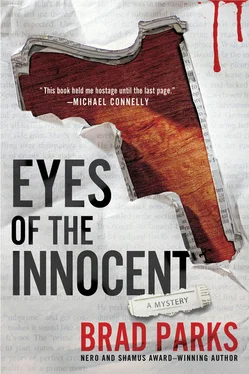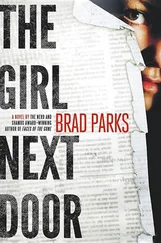Brad Parks - Eyes of the Innocent
Здесь есть возможность читать онлайн «Brad Parks - Eyes of the Innocent» весь текст электронной книги совершенно бесплатно (целиком полную версию без сокращений). В некоторых случаях можно слушать аудио, скачать через торрент в формате fb2 и присутствует краткое содержание. Год выпуска: 2011, ISBN: 2011, Издательство: Minotaur Books, Жанр: Триллер, на английском языке. Описание произведения, (предисловие) а так же отзывы посетителей доступны на портале библиотеки ЛибКат.
- Название:Eyes of the Innocent
- Автор:
- Издательство:Minotaur Books
- Жанр:
- Год:2011
- ISBN:0312574789
- Рейтинг книги:3 / 5. Голосов: 1
-
Избранное:Добавить в избранное
- Отзывы:
-
Ваша оценка:
- 60
- 1
- 2
- 3
- 4
- 5
Eyes of the Innocent: краткое содержание, описание и аннотация
Предлагаем к чтению аннотацию, описание, краткое содержание или предисловие (зависит от того, что написал сам автор книги «Eyes of the Innocent»). Если вы не нашли необходимую информацию о книге — напишите в комментариях, мы постараемся отыскать её.
Eyes of the Innocent — читать онлайн бесплатно полную книгу (весь текст) целиком
Ниже представлен текст книги, разбитый по страницам. Система сохранения места последней прочитанной страницы, позволяет с удобством читать онлайн бесплатно книгу «Eyes of the Innocent», без необходимости каждый раз заново искать на чём Вы остановились. Поставьте закладку, и сможете в любой момент перейти на страницу, на которой закончили чтение.
Интервал:
Закладка:
I was just starting to settle into the story when “Thang, Sweet” popped up on my cell.
“It’s not here,” she said breathlessly. “The mortgage. It’s not here.”
“What do you mean it’s not there? It has to be there,” I said, annoyed she couldn’t complete such a simple reporting errand.
“I know, but it’s not.”
“What address did you use?”
She repeated the number on Littleton Avenue that she and I had both seen earlier that day.
“You went to the Register of Deeds and Mortgages, right?” I asked.
“Yeah, and I typed ‘Akilah Harris’ into the computer, and nothing came up. Then I searched by address, and nothing came up. Then I looked up the block and lot number and searched under that, but nothing came up.”
I sighed and peeked up at the clock. It told me I didn’t have time to run up to the courthouse.
“So I flirted with one of the male title searchers and got him to help me,” Sweet Thang continued. “He was this total stoner, and stoners don’t usually go for me, because I’ve got more of that wholesome look, you know? Anyway, he couldn’t find it on the computer so he looked up the deed and got the recording date. Then he went into the books with the hard copies. He didn’t know where the book was and he was going to give up, so I flirted with him some more. Finally, he found it. The book had been misfiled. And then when he got to where the mortgage was supposed to be, he said it had been ripped out.”
“Ripped out?”
“That’s what he said. Then I had him show it to me. There was a space where it should have been. But it jumped from page 177 to page 195. He said it was totally weird and he had never seen anything like it before.”
“Yeah, me neither,” I said.
“Then I asked one of the office clerks, and he was this nice guy at first, really helpful. Then he went away for a little while, and when he came back he was all weird with me. He said it wasn’t there and I had to leave.”
I frowned.
“Did the clerk know you were a reporter?” I asked.
“Yeah. He was really nervous about that. He practically kicked me out. He was just like, ‘You have to leave. I’m sorry, you have to leave.’ ”
I frowned some more. Perhaps if I thought about it, I could produce a perfectly reasonable, perfectly innocent explanation for why documents pertaining to a scandalously predatory loan were missing. But nothing was coming immediately to mind.
Something wasn’t right.
Primo had been one of the first Brazilians to arrive in Newark during the late 1980s, never realizing he was in the vanguard of what eventually became a substantial migration.
His father, a well-respected civil engineer, begged Primo not to go, trying to reason with him. Primo was also an engineer. With his father’s connections, and with Brasilia in the midst of a building boom, there would be plenty of work for many years to come. Why leave for a country where he knew no one and lacked the proper credentials to continue in his chosen field?
Primo was adamant. The father threatened to disown the son. Primo told him to go ahead. He was twenty-seven years old. He wanted a fresh start in America. He was leaving behind everything-his job, his wife, even a small child. He told his wife he would send for her just as soon as he got settled.
But that was a lie. Upon arriving in America, he severed all contact. He changed his name. Then he changed it again. He learned how to manipulate the American system to give himself multiple identities, none of which were truly his own.
He settled in the section of Newark known as the Ironbound, so named because it was surrounded by railroad tracks on all sides. It was almost entirely Portuguese back then, but that was not a problem for Primo. They spoke the same language. And even though the Portuguese knew he wasn’t one of them-his accent was different, his skin darker-they tolerated him.
Primo took whatever job he could find at first. He parked cars at a garage in downtown Newark during the day. He bussed tables at a Portuguese restaurant on weekends. He lived in a cold-water flat above a jewelry store, making a deal with the store’s owner living where he lived rent-free in exchange for sleeping in the store at night with a pistol.
With virtually no expenses beyond food, Primo saved every penny he could. After a few years, he had enough to purchase an old row house, free and clear. He quit his restaurant job, spending every night and weekend for three months turning the dilapidated house into a tidy-looking home. He took some shortcuts, but only the kind a building inspector would notice. Then he bribed the building inspector. Before long, he sold the house for a handsome profit.
It was a start.
Primo bought another house, then another. He bought shrewdly, being careful not to overextend himself, always working harder and, most of all, smarter. He bid on houses that appeared to be worthless-the ones that looked like they were about to fall over-then used his engineering knowledge to prop them back up. It was amazing what you could do with a few two-by-tens, nailed in just the right spots.
And in a town like Newark, with its aging wooden housing stock, there were plenty of falling-over houses for him to buy. He continually reinvested the profits from his successes, taking only a bare minimum out for his living expenses. Most of the time, he just threw down a sleeping bag in whatever house he happened to be fixing up at the moment, dozing with a loaded gun next to him just in case any neighborhood vagrants got ideas.
Soon, he had more houses than he had time for. So he hired a team to work for him. They were all fresh-off-the-boat Brazilian immigrants who, under Primo’s tutelage, could prop up a house and primp it for sale in just weeks. As Brazilians continued arriving throughout the 1990s, Primo’s workforce grew. Two teams became four teams. Four became six.
He was slowly building an empire.
CHAPTER 2
People sometimes ask me how I write, whether I favor a particular method or technique. I try to tell them writing is an individual process and that one person’s system probably won’t work for someone else. But if they persist, I usually tell them the truth. For me, the essence of writing comes down to one simple thing:
Frequent urination.
The first thing I do upon sitting down is hit the caffeine. Usually it’s Coke Zero, but sometimes, in the early morning or later at night, I go for tea. I’ll drink Diet Pepsi if I have to, but only under desperate circumstances. I never drink coffee. I may be the only journalist in the world who despises coffee.
After consuming my caffeinated beverage of choice, I switch to noncaffeinated-usually water, to avoid dehydration. Then I jump back to the caffeine. I continue this alternating pattern until the writing is done.
The end result is that I pee like I’m about to run the Kentucky Derby. Once I get going, I can’t last more than about twenty minutes without a trip to the loo.
Maybe that sounds like an annoyance, but I’ve found it to be an essential part of the writing process. It’s during these many trips to the bathroom that the magic happens. Turns of phrase leap into my head, transitional sentences mysteriously appear, narrative structure makes itself apparent. The pee flows out, the words flow in. I’m not sure if this is some kind of cosmic balancing act-I try not to think about the physics behind it-I just know it’s happened too many times to be mere coincidence.
Clearly, I wouldn’t recommend this method for anyone with urinary incontinence. And it does come with some limitations: instead of worrying about writer’s block, I fret over sewer capacity; I could never consider a job as a foreign correspondent in Europe because the pay toilets would bankrupt me; and with longer articles, I end up getting so overcaffeinated I shake like an eighties hair-band drummer.
Читать дальшеИнтервал:
Закладка:
Похожие книги на «Eyes of the Innocent»
Представляем Вашему вниманию похожие книги на «Eyes of the Innocent» списком для выбора. Мы отобрали схожую по названию и смыслу литературу в надежде предоставить читателям больше вариантов отыскать новые, интересные, ещё непрочитанные произведения.
Обсуждение, отзывы о книге «Eyes of the Innocent» и просто собственные мнения читателей. Оставьте ваши комментарии, напишите, что Вы думаете о произведении, его смысле или главных героях. Укажите что конкретно понравилось, а что нет, и почему Вы так считаете.












